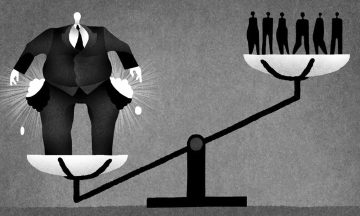 Social class is notoriously hard to change, persisting over time within individuals, and even across generations within families. Why is it that the social standing you’re born with is most likely the social standing you’ll die with? Our work provides complementary answers to this question; in a recent paper, we integrate all these various perspectives into a model of the vicious psychological cycle of social class.
Social class is notoriously hard to change, persisting over time within individuals, and even across generations within families. Why is it that the social standing you’re born with is most likely the social standing you’ll die with? Our work provides complementary answers to this question; in a recent paper, we integrate all these various perspectives into a model of the vicious psychological cycle of social class.
In related work, we seek to understand how social class shapes how people view themselves, what they expect from the world, and how others treat them. And, we are interested in how people perceive their own social class. When you ask an ordinary person on the street to tell you what her standing is in society, what kinds of factors guide her response? Is it mostly driven by her own salary or her education? Or is it more about how many horses she rode as a child, or whether she knows the difference between a salad fork, a fish fork and a dessert fork?
*A good deal of current research in the lab focuses on this topic*
Engstrom, H. R., Laurin, K., Zuroff, D. C., & Schmader, T. (2025). Do people lead men and women differently? Multimethod evidence that group gender affects leaders’ dominance. Journal of Experimental Psychology: General. Advance online publication.
Laurin, K., Guan, K. W., & Younge, A. (2025). Does saying “thanks a lot” make you look less than? The magnitude of gratitude shapes perceptions of relational hierarchy. Social Psychological and Personality Science.
Laurin, K., Engstrom, H. R., & Huang, M. (2024). What will my life be like when I’m 25? How children’s social class contexts predict their imagined and actual futures. Journal of Social Issues.
Laurin, K., Engstrom, H. R., Alic, A., & Tracy, J. L. (2024). Is being elite the same as living an easy life? Two distinct ways of experiencing subjective SES. Journal of Personality and Social Psychology, 127, 822-845.
Engstrom, H. R., Laurin, K., Kay, N. R., & Human, L. J. (2024). Socioeconomic status and meta-perceptions: How markers of culture and rank predict beliefs about how others see us. Personality and Social Psychology Bulletin, 50, 1386-1407.
Engstrom, H. R., & Laurin, K. (2024). Lower social class, better social skills? A registered report testing diverging predictions from the rank and cultural approaches to social class. Journal of Experimental Social Psychology, 11, Article 104577. [registered report]
Laurin, K., & Engstrom, H. R. (2020). The context of low socioeconomic status can undermine people’s motivation for financial success. Current Opinion in Psychology, 33, 105-109.
Friesen, J. P., Laurin, K., Shepherd, S., Gaucher, D. & Kay, A. C. (2019). System justification: Experimental evidence, its contextual nature, and implications for social change. British Journal of Social Psychology, 58, 315-339.
Laurin, K., Engstrom, H., & Alic, A. (2019). Motivational accounts of the vicious cycle of social status: An integrative framework using the United States as a case study. Perspectives in Psychological Science, 14, 107-137.
Belmi, P., & Laurin, K. (2016). Who wants to get to the top? Class and lay theories about power. Journal of Personality and Social Psychology, 111, 505-529.
Laurin, K., Fitzsimons, G. M., Finkel, E J., Carswell, K. L., vanDellen, M. R., Hofmann, W., Lambert, N. M. Eastwick, P. W., Fincham, F. D., & Brown, P. C. (2016). Power and the pursuit of a partner’s goals. Journal of Personality and Social Psychology, 110, 840-868.
Laurin, K., Fitzsimons, G. M., & Kay, A. C. (2011). Social Disadvantage and the Self-Regulatory Function of Justice Beliefs. Journal of Personality and Social Psychology, 100, 149-171.
Kay, A. C., Banfield, J., Laurin, K. (2010). Ideology and power. In T. Vescio & A Guinote (Eds.),The Social Psychology of Power. New York: Guilford Press.